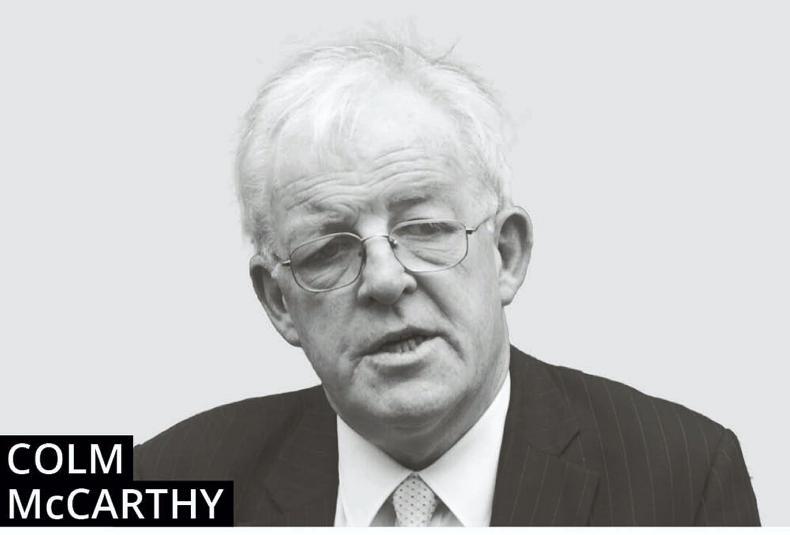Governments around Europe will scramble to repair their fiscal accounts once the COVID-19 epidemic comes under control. In the meantime, there is no alternative to heavy budget deficits, since the pharma industry does not expect to have a vaccine delivered until mid-2021. Whether deficits can be financed easily by the more indebted countries, including Ireland, will depend on the policies pursued by the European Central Bank (ECB). The oldest central banks were established to fund governments and they still do so in emergencies.
Both the Bank of Japan and the US Federal Reserve have made it clear in recent days that they will buy government debt if needs be, without arbitrary limits or policy conditions. The ECB is unique in that it has 19 governments to worry about and a reluctance to support the Eurozone governments bond markets when circumstances require it to do so. A failure at the ECB will exacerbate the economic fall-out from COVID-19, just like the ECB’s faltering response to the financial crisis that commenced in 2008.
The Irish Government has taken economic policy actions that deliver interim income support to the households that need it and credit support for viable firms. The other leg of policy, since Ireland has no currency and hence no independent central bank, is to hope that the ECB produces a more coherent response on this occasion than was inflicted on the vulnerable last time round.
Aside from help to households and small businesses, the government will likely face demands for help from bigger firms too. The small firms will expect help through forbearance from their bankers, which is not costless to the State. Two banks, AIB and Permanent TSB, are majority-owned by the Government, which is also a sizeable minority shareholder in Bank of Ireland. One politician has demanded that the banks should now rescue the public, since the public rescued the banks, seemingly unaware that the public now owns a large slice of the banking system.
Things could get very difficult for the banks if there is a prolonged and deep recession and a pre-emptive injection of equity into these institutions could prove wise. They will face capital stress as bad debt provisions mount and their shares are not expensive after the recent market shakeout. They have stopped paying dividends to conserve capital and their profitability will evaporate for a while. The banks could be fine, but there is serious risk.
Some of the State commercial companies will also face bad debt problems. The ESB reported profits after tax recently of €338m for 2019 and has agreed to pay a dividend of €88m, 26% of the surplus. The shutdown will cut electricity demand and they could struggle with collection problems in the next few years. The company has a solid A- credit rating and a big balance sheet, over €14bn in total assets. The dividend drain is a relatively minor issue, although a prudent shareholder might have shown more patience.
But some of the other semi-states are not so fortunate. Public transport volumes have collapsed and the CIE group companies, including Bus Eireann, Dublin Bus and Irish Rail, will require even larger subsidies. No company can do better than its customers and the most vulnerable must be Dublin Airport (called daa plc, of which I was a board member until recently), whose customers are airlines, amongst the biggest corporate casualties of the epidemic.
Airlines
The Government is lucky they disposed of their shareholding in Aer Lingus, now part of the International Airlines Group which includes British Airways and Iberia. If it was still an Irish state company, it would be a bail-out candidate. The other big customer is Ryanair, likely to be a long-term beneficiary of the inevitable shake-out in the airline industry and with a strong balance sheet. They will need it, since Ryanair must be bleeding cash as they cut back operations. They are on track to cut operations by 90%, as are Lufthansa and most others – easyJet have grounded their entire fleet.
Ryanair and Aer Lingus between them deliver about three-quarters of Dublin Airport’s aeronautical revenues. Over the month of April, passenger traffic at Dublin looks set for a decline of 80% or more and daa’s ancillary income from parking and retail concessions will fall in tandem. The company’s overseas business in airport retailing and facilities management is facing similar declines and it is unrealistic to expect any bottoming-out before autumn at the earliest. It’s likely that the company will see at least half of its group turnover of about €900m vaporised and will begin to incur heavy deficits. There is no point in seeking to extract dividends from daa.






 This is a subscriber-only article
This is a subscriber-only article









SHARING OPTIONS: